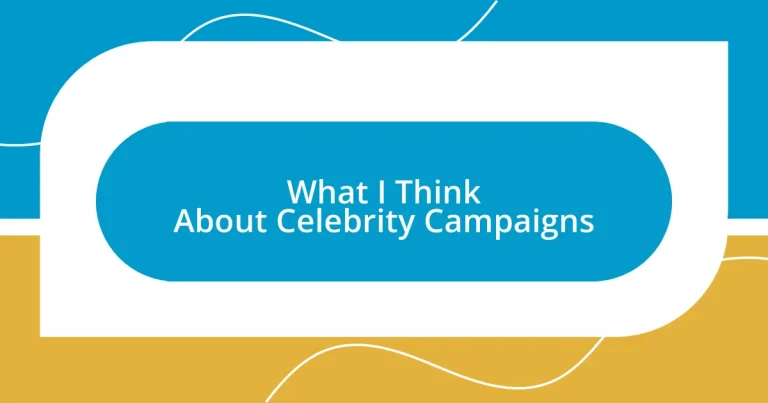Key takeaways:
- Celebrity campaigns leverage the emotional connection and influence of public figures to amplify messages and engage audiences, often leading to meaningful social change.
- Authenticity is crucial; campaigns succeed when celebrities genuinely align with the brand’s values, while insincerity can lead to skepticism and diminished effectiveness.
- Future trends include a focus on relatable figures and intersectional advocacy, as well as the integration of emerging technologies like AR and VR for enhanced storytelling.
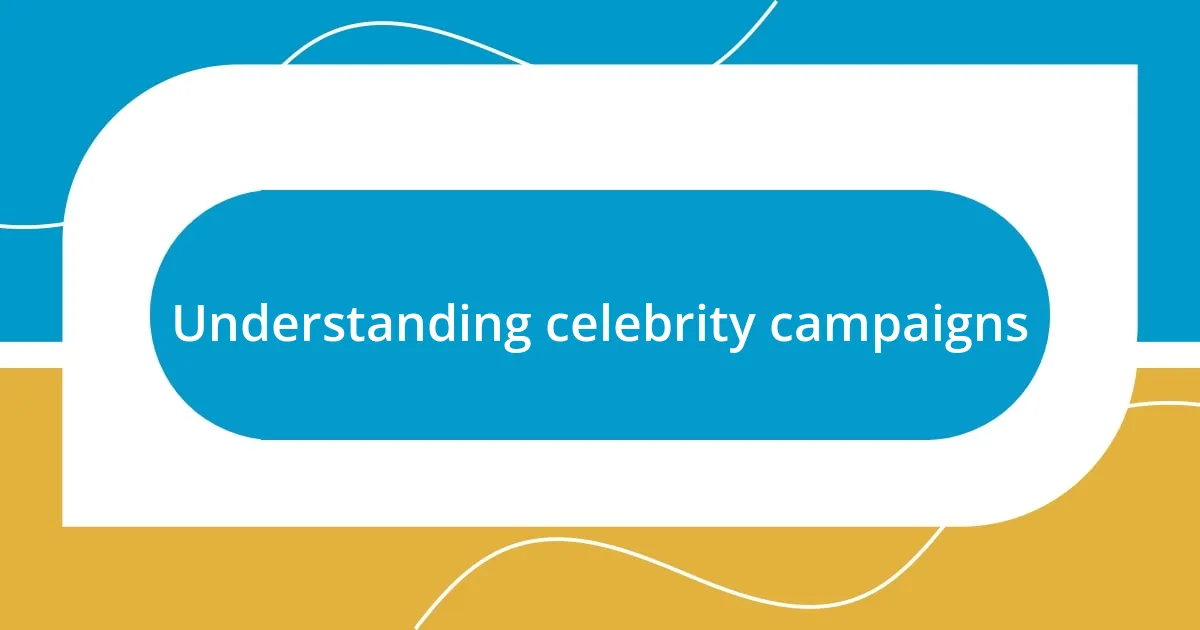
Understanding celebrity campaigns
Celebrity campaigns, at their core, leverage the influence of well-known personalities to amplify messages and reach wider audiences. I remember the first time I saw an ad featuring a beloved actor advocating for climate change. It struck me how their charm made the urgent message feel more relatable—doesn’t it just make you pause and think about how public figures can shape our perspectives?
These campaigns often bring a unique blend of glamour and urgency. When celebrities share their personal stories related to a cause, it creates an emotional connection that statistics alone can’t achieve. I often ask myself, how can a simple story from someone like a famous musician spark actual change? It’s fascinating to witness how these narratives can ignite passion in everyday people.
Moreover, the alignment of a celebrity’s image with a cause can produce varying results. Some champions genuinely resonate with their causes, while others might feel more like a marketing strategy. I can’t help but wonder, are we more likely to support a cause because we admire the celebrity behind it? This intersection of fame and activism poses intriguing questions about our motivations and values.
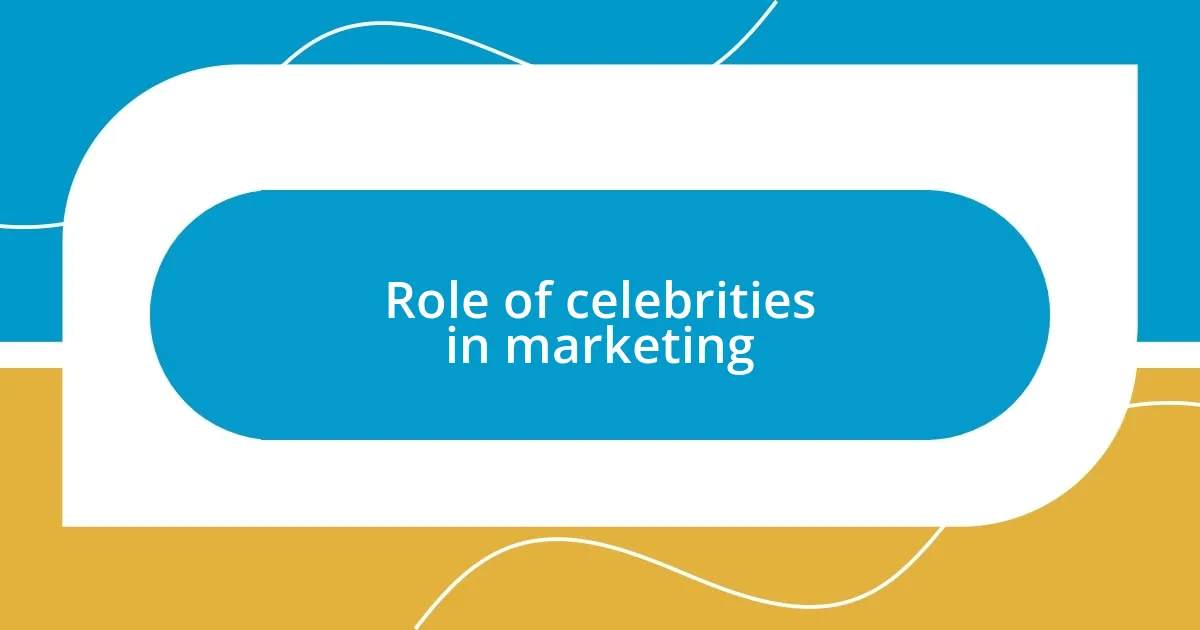
Role of celebrities in marketing
The role of celebrities in marketing extends beyond mere endorsement; it’s about creating a strategic partnership that resonates with audiences. I vividly remember a time when a beloved athlete endorsed a fitness app. Their commitment to health and wellness was so palpable that it inspired me to take action in my own life. Celebrities have this unique ability to drive engagement and create a sense of community around shared values, which can significantly enhance consumer loyalty.
Here are some key points about how celebrities influence marketing:
- Trust Factor: Many people tend to trust a product more if a favored celebrity is associated with it.
- Cultural Impact: Celebrities can shape trends and cultural conversations, often influencing public perception.
- Emotional Connection: When a celebrity shares a personal experience, it can evoke strong emotions, leading to deeper consumer attachment.
- Wider Reach: Their large social media followings can amplify marketing messages dramatically, reaching demographics that brands may struggle to connect with otherwise.
- Brand Identity: The association with a celebrity can redefine or enhance a brand’s identity, making it more appealing to target audiences.
In my view, this dynamic interplay between stars and marketing is fascinating, as it showcases not just how products are sold, but how lives and stories are shaped in the process.
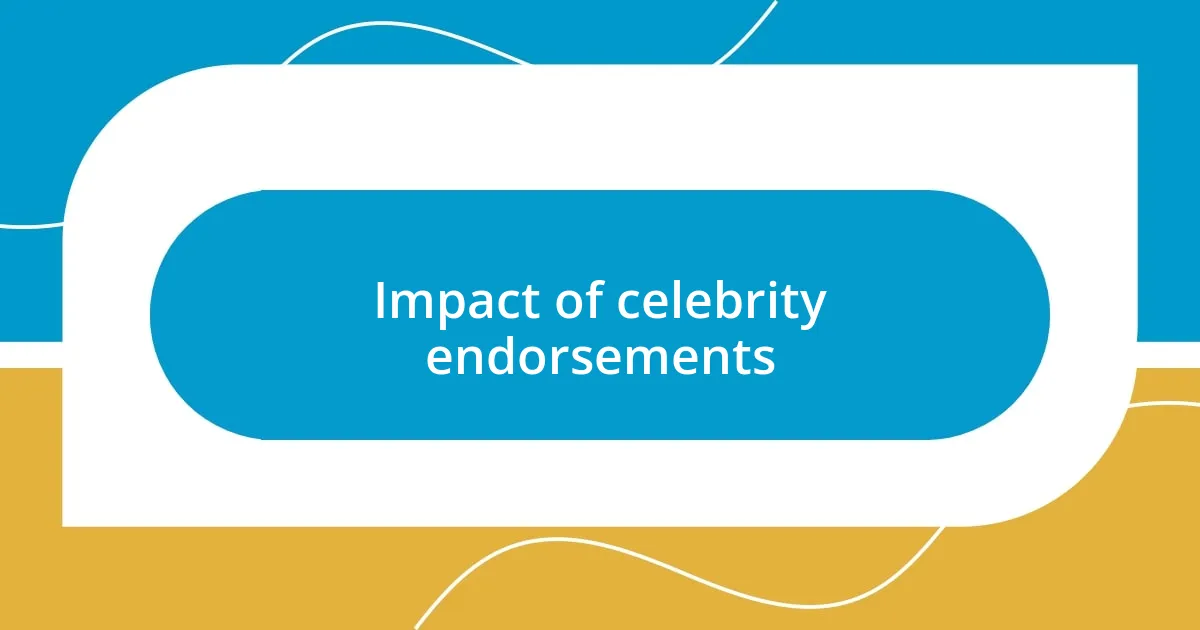
Impact of celebrity endorsements
The impact of celebrity endorsements can be profound and multifaceted. I recall watching a heartfelt commercial where a well-known actress spoke about mental health struggles. It was eye-opening to see how her vulnerability created an immediate connection with viewers. That moment made me realize that when a trusted figure speaks openly, it can encourage others to seek help or support causes they might hesitate to engage with otherwise.
Moreover, research shows that celebrity endorsements can significantly elevate brand recognition and affinity. In my experience, when a favorite celebrity promotes a product, I find myself more inclined to try it, even if I hadn’t considered it before. It’s as if their approval adds an extra layer of credibility. This phenomenon isn’t just a fleeting trend; it reflects a deeper psychological connection we form with these figures who permeate our lives through media.
On the downside, there’s a risk that the effectiveness of endorsements can diminish if consumers sense insincerity. For instance, I remember when a pop star endorsed a soda brand, but the constant, flashy advertisements seemed more like a cash grab than genuine support. This made me question the sincerity of the connection—if celebrities aren’t genuinely passionate about what they promote, do we lose interest? It’s essential for brands to partner with celebrities who authentically align with their values to maintain trust and engagement.
| Positive Impact | Negative Impact |
|---|---|
| Builds trust and credibility with the audience. | Can lead to skepticism if endorsements feel insincere. |
| Creates emotional connections that inspire action. | Possible backlash if the celebrity faces negative publicity. |
| Amplifies brand visibility and reach. | Risk of overshadowing product quality with celebrity status. |
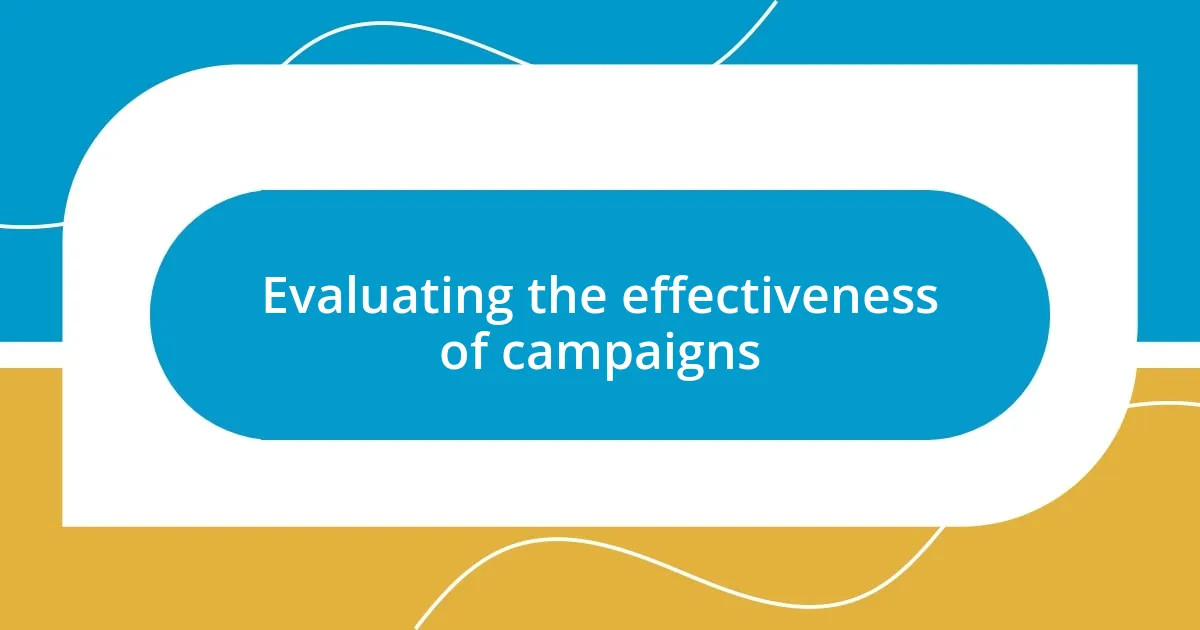
Evaluating the effectiveness of campaigns
Evaluating the effectiveness of campaigns can often feel like peeling an onion; with layers to uncover, each reveal can bring tears—or insights! From my experience, a solid metric for success is audience engagement. I once observed a clothing brand launch a campaign featuring a popular actor, and the buzz on social media was overwhelming. The hashtags were trending, and the conversations sparked made me wonder: how much of that engagement actually impacted sales?
Another vital aspect to consider is whether campaigns drive conversations beyond the initial buzz. I recall a skincare line that teamed up with a well-known influencer for a charity initiative. While the campaign generated a lot of attention, it was the follow-up discussions about skincare education that truly caught my interest. I found myself engaged in a community that shared tips and experiences, demonstrating how effectiveness goes beyond numbers—it’s about creating lasting connections.
On the flip side, it’s important to watch for potential pitfalls. One campaign I follow involved a celebrity chef promoting a food product, which started strong but fizzled out quickly due to a single cooking mishap aired on television. I couldn’t help but ask myself: did that one moment overshadow the whole campaign? It highlighted to me that authenticity and consistency are crucial in maintaining the effectiveness of celebrity campaigns—once trust is lost, it can be challenging to regain it.
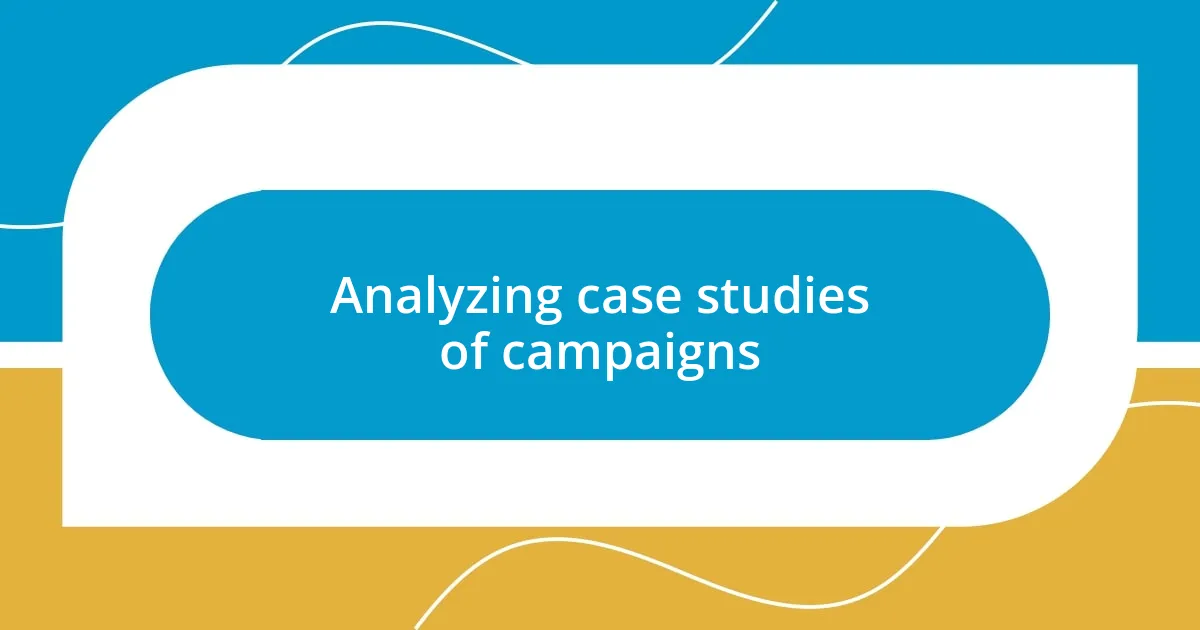
Analyzing case studies of campaigns
When analyzing case studies of celebrity campaigns, I often consider the emotional narratives they weave. For example, one campaign that stands out to me involved a popular actor who shared his journey of overcoming addiction. The authenticity of his story resonated with many, creating a wave of support not just for the brand but for the cause itself. I remember feeling a profound connection to his message, which made me reflect on personal struggles in my own life. Isn’t it remarkable how a single story can spark such powerful conversations?
Another example that piqued my interest was a campaign by a renowned singer advocating for climate change awareness. Her charismatic presence drew attention, but what really fascinated me was the surge in user-generated content where fans shared their own environmental actions. Seeing this ripple effect made me question: how often do celebrities inadvertently empower their audience to become advocates? This case illuminated the potential for campaigns to extend their reach far beyond initial intentions, championing social issues alongside brand identity.
However, I’ve also witnessed campaigns that quickly unraveled due to a poor choice of celebrity or misalignment with audience values. A fashion brand once partnered with a celebrity whose lifestyle didn’t resonate with its core customers, and the backlash was immediate. It left me wondering, can misalignment damage a brand’s reputation beyond repair? This hit home for me, emphasizing the delicate balance of selecting the right celebrity for collaboration; it’s truly a dance that requires understanding both the celebrity’s persona and the audience’s expectations.

Best practices for success
When embarking on a celebrity campaign, one of the best practices is to align the chosen celebrity with the core values of your brand. I remember a beauty brand that collaborated with an eco-conscious actress; their shared commitment to sustainability felt authentic and engaging. This cohesion not only enhanced brand credibility but also made it easier for consumers to feel connected to both the celebrity and the product. Isn’t it interesting how much a celebrity’s personal values can amplify a brand’s message?
Another crucial element is crafting a narrative that goes beyond mere promotion. A tech company I observed partnered with a beloved comedian, not just to showcase their gadgets but to tell a humorous story about everyday tech challenges. The campaign quickly turned into a series of relatable skits, making me chuckle while also reflecting on my own tech struggles. It made me ponder: what if we all infused a bit of humor into our marketing strategies—couldn’t that foster a stronger relationship with our audience?
Lastly, measuring the long-term impact of a campaign is vital, as initial success might not indicate lasting value. There was a time I followed a popular musician’s endorsement of a health drink. Initially, the sales boomed, but months later, interest waned. This left me questioning, what happened to the ongoing dialogue that should have nourished customer loyalty? Emphasizing sustained engagement helps ensure that the celebrity’s influence continues well beyond the launch—keeping the conversation alive and relevant in the consumers’ minds.
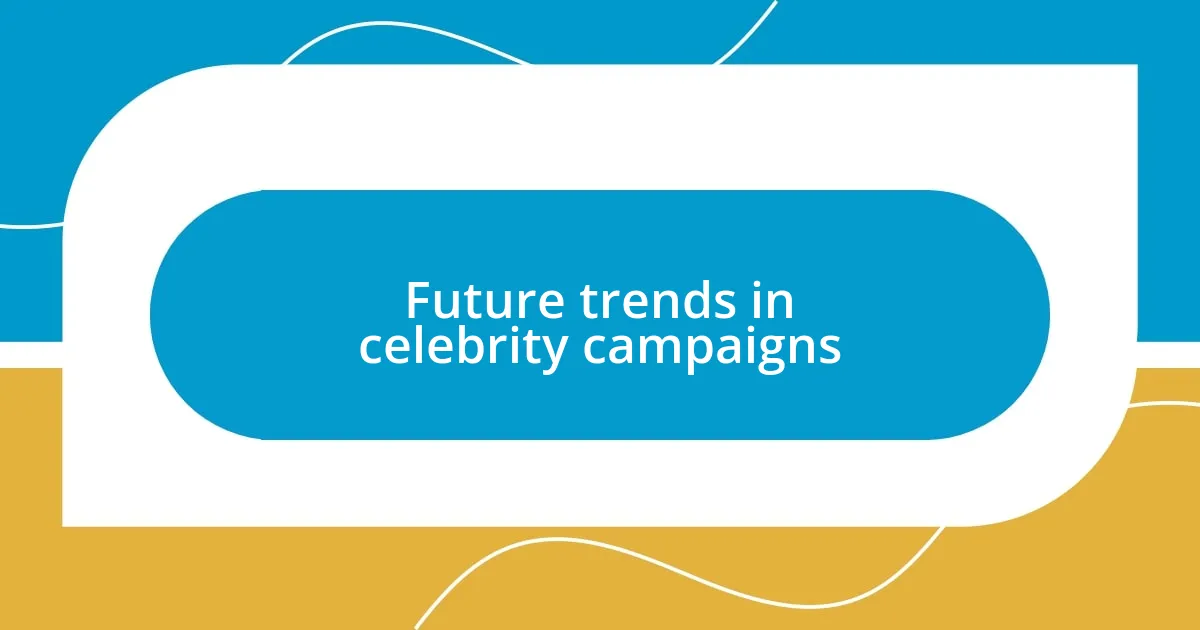
Future trends in celebrity campaigns
Looking ahead, I see a growing trend toward authenticity in celebrity campaigns. More brands are recognizing that consumers crave genuine connections, and they’re seeking celebrities who embody realness. For instance, I recently came across a campaign featuring a young influencer sharing her struggles with mental health. It struck me how powerful it was to see someone relatable fronting a campaign instead of the usual Hollywood elite. Could this be a turning point toward more relatable figures being celebrated in marketing?
Another trend I predict is the rise of intersectional advocacy. Celebrities are starting to champion multiple causes, blending social justice with their brand endorsements. I think about how a well-known actress spearheaded a campaign for both body positivity and mental health awareness, demonstrating the interconnectedness of our daily struggles. It inspires me to think—what if more brands encouraged their ambassadors to voice diverse narratives that resonate with different aspects of our lives? Wouldn’t that foster a richer dialogue around their marketing messages?
Finally, I can’t help but feel excited about the potential for technology to play an even larger role in celebrity campaigns. With the rise of augmented reality (AR) and virtual reality (VR), imagine a world where I could “experience” a celebrity’s journey through a VR lens. It’s intriguing, right? Emerging tech opens up limitless possibilities for storytelling—allowing us to be in the moment alongside our favorite stars. How will brands adapt to seize this next wave of innovation? It’s a fascinating question to ponder as we witness the dynamic evolution of celebrity-endorsed campaigns.












